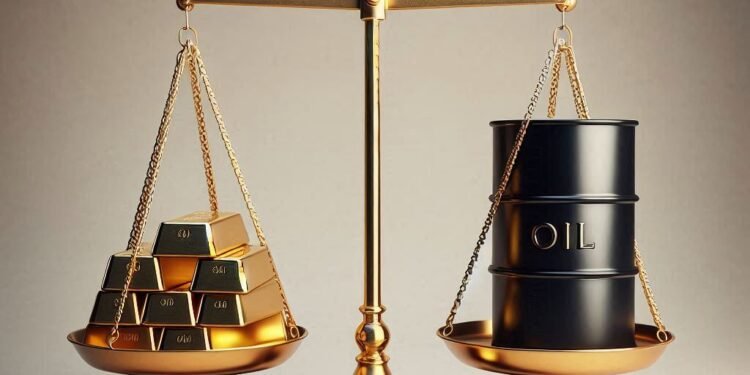Gold vs oil is a common debate among investors seeking reliable commodities. Both assets have long influenced the global economy, but which is better for your portfolio in 2025?. Both have performed vital roles in the worldwide economic system for decades, and each attract traders trying to hedge in opposition to inflation, diversify their portfolios, or make the most of marketplace moves.
But which one is the higher investment for you—gold or oil? In this beginner-friendly manual, we’ll smash down the important thing differences, dangers, and benefits of both, supporting you make an knowledgeable decision.
Understanding Commodities: Gold and Oil in a Nutshell
Before we dive into the pros and cons, let’s outline what those two commodities without a doubt are.
Gold is a precious metal valued for its shortage, balance, and historical use as money. It’s frequently visible as a “safe haven” at some point of instances of monetary uncertainty. You can invest in gold thru bodily bullion, ETFs, mining shares, or futures contracts.
Oil, especially crude oil, is a vital energy useful resource used to power automobiles, industries, and complete economies. Unlike gold, oil is a consumable commodity, that means it receives used up and continuously replenished. You can spend money on oil via futures, oil-associated ETFs, or stocks of electricity groups.
Gold: The Safe Haven Asset
1. Stability in Times of Crisis
Gold has lengthy been taken into consideration a safe-haven asset. When markets crash or inflation soars, buyers regularly rush to gold. Why? Because gold has a tendency to preserve its cost—even if currencies or stock markets lose theirs.
2. Inflation Hedge
One of gold’s largest advantages is its reputation as an inflation hedge. When the buying electricity of cash drops, gold expenses frequently rise, preserving your wealth.
3. Long-Term Value
Gold doesn’t rust, degrade, or emerge as out of date. Its intrinsic price has stood the take a look at of time. Unlike agencies or technology that may lose relevance, gold is constantly in demand.
4. Low Correlation with Stocks
Gold has a tendency to transport independently of the inventory market. That makes it a outstanding diversifier in your portfolio—specially throughout downturns.
But Gold Isn’t Perfect…
No Passive Income: Gold doesn’t pay dividends or interest. You make money best if its charge goes up.- Price Volatility: While it’s greater stable than oil, gold charges can nevertheless vary sharply within the short time period.
- Storage Issues: If you spend money on bodily gold, you’ll want a secure place to save it. This provides more fee and complexity.
Oil: The Economic Engine
- High Demand, Global Use
Oil fuels economies. From automobiles to jets to factories, almost each industry is based on oil. This constant demand makes it one of the most actively traded commodities. - Short-Term Trading Opportunities
Oil fees can be extraordinarily volatile—frequently motivated with the aid of geopolitical events, natural screw ups, or deliver chain disruptions. For investors, this indicates massive possibilities for quick-time period profits. - Income Potential
Investing in oil companies can provide you with publicity to dividends and income increase. Unlike gold, you could earn passive income from power stocks or ETFs.
4. Correlation with Economic Growth
When economies are booming, oil demand usually rises. This ties oil carefully to worldwide boom traits, giving it the potential to surge for the duration of monetary upturns.
But Oil Comes With Its Risks…
- Environmental & Political Sensitivity: Oil prices are rather sensitive to political instability, environmental policies, and OPEC choices.
- Not a Safe Haven: Unlike gold, oil charges generally tend to fall at some point of economic crises or recessions.
- Finite Resource: As the arena shifts to purifier energy, the lengthy-time period call for for oil may want to decline.
Gold vs Oil: Key Differences at a Glance
| Feature | Gold | Oil |
|---|---|---|
| Safe Haven | ✅ Yes | ❌ No |
| Income Generation | ❌ No | ✅ Yes (via stocks) |
| Inflation Hedge | ✅ Yes | ⚠️ Somewhat |
| Price Volatility | ⚠️ Moderate | ✅ High |
| Environmental Risks | ❌ No | ✅ Yes |
| Correlation with Economy | ❌ Low | ✅ High |
| Long-Term Demand | ✅ Strong | ⚠️ Uncertain |
Which One Should You Choose?
The answer relies upon in your goals and threat tolerance.
- If you are a conservative investor trying to protect your wealth and sleep well at night, gold is probably the higher alternative. It’s stable, dependable, and has an extended records as a shop of value.
- If you’re a chance-tolerant dealer aiming for excessive returns and you are ok with short-term swings, oil should offer more upside—particularly in case you’re having a bet on economic boom or geopolitical activities.
- For portfolio diversification, proudly owning each may be a clever method. Gold can act as a protective asset, whilst oil offers increase ability tied to the global economic system.
Tips Before You Invest
- Do Your Research: Understand the fundamentals using each commodity.
- Use the Right Platform: Choose a brokerage that gives access to ETFs, futures, or commodity-related shares.
- Diversify: Don’t pass all-in on one asset. Spread your threat across more than one investments.
- Watch the News: Geopolitics, primary bank guidelines, and supply disruptions can all effect costs.
- Start Small: Test the waters with small investments earlier than scaling up.
Final Thoughts: Choose What Aligns with Your Strategy
Gold and oil are both powerful gear in an investor’s arsenal—but they serve extraordinary purposes. Gold shines in times of worry. Oil fuels prosperity in instances of boom.
There’s no person-length-fits-all answer right here. The key is to apprehend your own goals, stay informed, and spend money on a manner that fits your consolation degree and financial method.
And remember: the first-class funding is one you understand and sense confident in. Whether you cross for gold, oil, or a mixture of each, make certain your desire helps your long-time period economic adventure.













